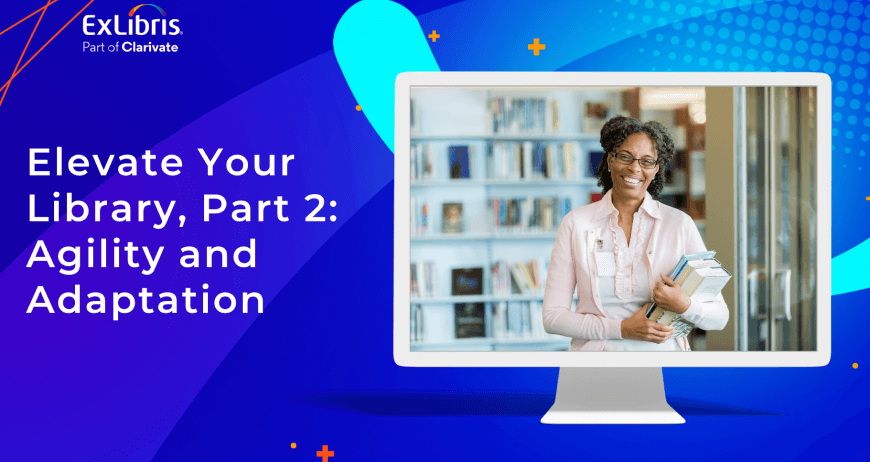Continuing our blog series on the questions libraries must address in a world of changing possibilities, needs and expectations, let’s dive into the role of technology.
In Elevate Your Library, Part 1, we touched on some effective technological solutions to handle the nearly universal challenge of shrinking budgets and uncertainty. This time, we will zoom out a bit to consider the role of solution openness and cloud-based services in elevating library management.
How are libraries becoming more agile and adaptive to change?
Many technological trends in library management – such as migration to the cloud, greater use of e-resources, customization, and flexibility – were evident before the Covid-19 pandemic. However, the pandemic significantly accelerated the pace of those changes, drove movement toward greater openness and has had other major, ongoing impacts in libraries across the world. To boost agility, libraries are turning to SaaS solutions, analytics, digital transformation, open applications and their community of peers.
SaaS solutions
SaaS solutions bring new agility to libraries, allowing them to adapt quickly to changing needs, to experiment with new services, and to work in completely different, more efficient ways.
The Ex Libris Higher Ed Platform is the unified cloud-based home for the library management system Alma; Leganto course resource list management system; the research information solution Esploro; Rapido for library resource sharing; and the discovery solutions Primo and Summon. This comprehensive platform enables the library to easily adopt the SaaS model for supporting teaching and learning, assisting researchers, and providing new services.
Continuous innovation and seamless rollout of new capabilities is an agility-enhancing hallmark of SaaS solutions. That is, whenever a librarian accesses the system or on-demand, the latest features are automatically installed. Ex Libris Alma, for example, provides updates multiple times each year, with more than 100 releases since the system was introduced. Each update or new release is automatically distributed across the entire Ex Libris Higher Ed Platform, ensuring that Alma and all other Ex Libris solutions are always in sync.
Analytics
Analytics have become a must-have for academic libraries, providing a deeper understanding of how the library operates and how it can improve. With greater visibility into library activities, this data can demonstrate the library’s value to the institution. Smart, comprehensive library analytics enable evidence-based decision-making at all levels and ensure that libraries get the most out of their budgets.
The Ex Libris Higher Ed Platform incorporates powerful analytics that help increase performance across the full range of library management processes. Leganto, for example, can quickly accommodate course lecturers and meet their requests thanks to its intelligent interface. In one case, the library team at the University of Edinburgh managed to increase the number of courses they supported by 67% within the first year after migrating to Leganto.
Digital transformation
Libraries have been steadily increasing digitization and expansion of their electronic collections for some time, but the advent of Covid-19 led many to shift virtually overnight to almost exclusively loaning electronic resources. The flexibility this shift demanded from librarians, vendors and technology providers is the basis for a more adaptive approach to resource management going forward, as libraries learn what mix of publications suits them best.
During the height of the pandemic in 2020-2021, the unique collaborative aspects of Ex Libris RapidILL helped to enable library agility and continued use of interlibrary loan. The RapidILL community responded very quickly to a completely online environment, removing print materials from RapidILL workflows and adapting lending terms, saving member libraries time and effort.
Ex Libris provides the support and tools necessary to systematically transition to collections with more digital and electronic resources. This includes integrating emerging resource management technologies such as controlled digital lending (CDL), which has become more common in many libraries.
Open applications
Libraries are seeking open solutions more often than ever before, so they can create, share and use customizations that best suit their particular needs. These solutions are generally commercial products, which means they often come with change and quality controls, as well as customer support.
Open applications allow access to data both through user interfaces and through application programming interfaces (APIs), enabling interactions with various technical components or applications. The Ex Libris software portfolio consists of open solutions, with more than 200 APIs giving programmatic access to data and workflows managed in the Higher Ed Platform. Users of Ex Libris products can build on the large API set to develop their own applications for additional functionality, streamlined workflows, integration with other systems and almost any other library-centered purpose. For example, more than 50% of Alma’s activity is currently API-driven and there are more than 1,000 API calls by Alma users every minute.
Customers can experiment and test their customizations on the Ex Libris Developer Network. In fact, Primo Studio makes it easy for library staff without coding or tech skills to use the Ex Libris Open Discovery Framework to customize their Ex Libris Primo discovery interface. Moreover, any integrations, extensions and customizations librarians create will not be disrupted by future upgrades of Ex Libris solutions.
Community
The more open a solution is, the more likely there is a user community around it. Members share ideas and interact with the solution developers in an organized, efficient manner. Being open is all about listening and collaborating with the community, enabling institutions to do what they need with minimal limitations and maximum confidence.
Ex Libris customers can share their customizations, accessories, tips and tricks with a very active global network of users through the Developer Network Tech Blog. They can also ask a question through the forum, which will be answered by community members or Ex Libris experts.
Next: Teaching and learning
In our next blog, we will look at how libraries are elevating their profile in academia and providing the kind of support students, teachers and researchers need in today’s personalized service environment.
For more on the topic of this blog series, read the full whitepaper “Five Questions That Can Elevate Your Library” here.
Learn more about the Ex Libris library software.










